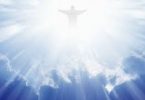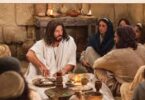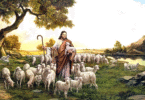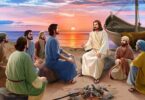19th Sunday of Ordinary Time (Year B)
Scripture reading: 1 Kings 19:4-8; Ps. 34:2-3, 4-5, 6-7, 8-9; Eph. 4:30-5:2; Jn. 6:41-51
Today, we celebrate Vianney Sunday and we honour the life of St. John Marie Vianney, the patron of diocesan priests. This feast invites us to celebrate the life of the priest in our parish. The life of a priest is modelled on the life of Jesus Christ. He went about preaching and teaching the Word of God. So the primary duty of a priest is after the celebration of holy mass and the sacraments is to proclaim the message of salvation. Therefore, it is said, “since nobody can be saved who has not first believed, it is the primary duty of priests as the co-workers of bishops to preach the Word of God to all people. Preaching the Word is one of the most important duties of the priest. Today’s liturgy highlights the importance of the Word of God in our lives. It tells us that the Word of God becomes the Bread of Eternal Life.
The first reading from the first book of Kings tells us that God provided miraculous food to the prophet Eliza. The little background to the story will help us to know God’s bountiful love for his beloved prophet. Prophet Eliza had challenged the prophets of Baal. Thus, he had challenged Queen Jezebel, the wife of King Ahaz who was a pagan. She had influenced people to worship Baal (the pagan god). As a result, the people suffered from a drought for more than three and half years. The prophet proved the falsehood of pagan gods. God consumed the victim offered by Prophet Eliza but the pagan prophets failed in it. Eliza took the occasion to slaughter more than four hundred prophets of Baal. The queen kindled with anger sought to kill the prophet.
In such a context, Prophet Eliza’s was running away. He was tired and exhausted in the wilderness. He was pleading for death. He had no hopes to live anymore. God sent an angel to him with the Word. He said, “get up and eat”. God provided him with bread and water. With that strength, he walked for forty days and nights to reach Mt. Horeb (Mt. Sinai), the mountain of God. The Word of God became the bread for prophet Eliza. It gave him the strength to walk the long journey to reach his destination.
The Gospel continues from the last Sunday’s Gospel. Jesus had claimed that he was the Bread of Life. The Jews had realized what it meant to be the Bread of Life. We reflected on it last Sunday. Jesus had openly proclaimed that he is the bread from heaven. In other words, Jesus had claimed that he was divine. Jews began to complain to each other about Jesus’ claim. They objected to it by claiming that they knew his parents. The expression used in the Greek indicates that they belittled him for they knew his family. Their behaviour was similar to the people of Israel in the wilderness. The evangelist tells us the truth behind their complaints. The Jews were not ready to accept Jesus, the Son of God in human form. They did not accept his divinity.
Jesus responded by telling them that his divinity would be taught by God himself. Jesus quoted the prophet Isaiah, “Your sons will all be taught by Yahweh” (Is. 54:13). Isaiah meant to say that God would not speak by his messenger but personally. This prophecy was fulfilled in the person of Jesus. Jesus was going through all the cities and villages, teaching in their synagogues and proclaiming the gospel of the kingdom (Mt. 4:23; 9:35). People were astonished and marvelled at his wisdom and miraculous power (Mt. 13:54). Those who accepted his teaching found salvation in their lives. His words became the bread for their journey of life.
The disciples who treasured all that Jesus taught them, went about proclaiming it to all nations. The Word of God became the food for their journey of life. The proclamation of the Word brought early Christians together. St. John the evangelist says in his prologue the Word became flesh and made his dwelling among us i.e. Jesus Christ (cfr. Jn. 1:14). The author of Hebrews saw Christ is the fulfilment of God’s self-communication to humans (cfr. Heb. 1:1-3). Hence, the second Vatican council states, “We come to the liturgy of the Word not just to hear words about Jesus but to open ourselves to the real presence of Christ who speaks to us.” (SC 7).
If the Word is the bread of eternal life then we need to thank God for the gift of our priests. One of the foremost important duties of the priests is to proclaim the Word of God. He proclaims the Word of God in the mass. He teaches us catechism. He teaches us to pray and read the word of God. He creates love in us for the Word of God. His ministry revolves around the Word of God. We have heard about St. John Marie Vianney spending hours and hours in the confession. But his witnesses tell us that he gave beautiful catechesis and reflections on the word of God. His reflections were very deep and insightful. He took his responsibilities of the priest seriously that thousands of people began to visit his parish. He made the word of God as the food for the journey of every person who came to him.
Let us pray during this mass that we may make the Word of God as our daily bread and learn to live by it because it is the Word that will give us eternal life.






